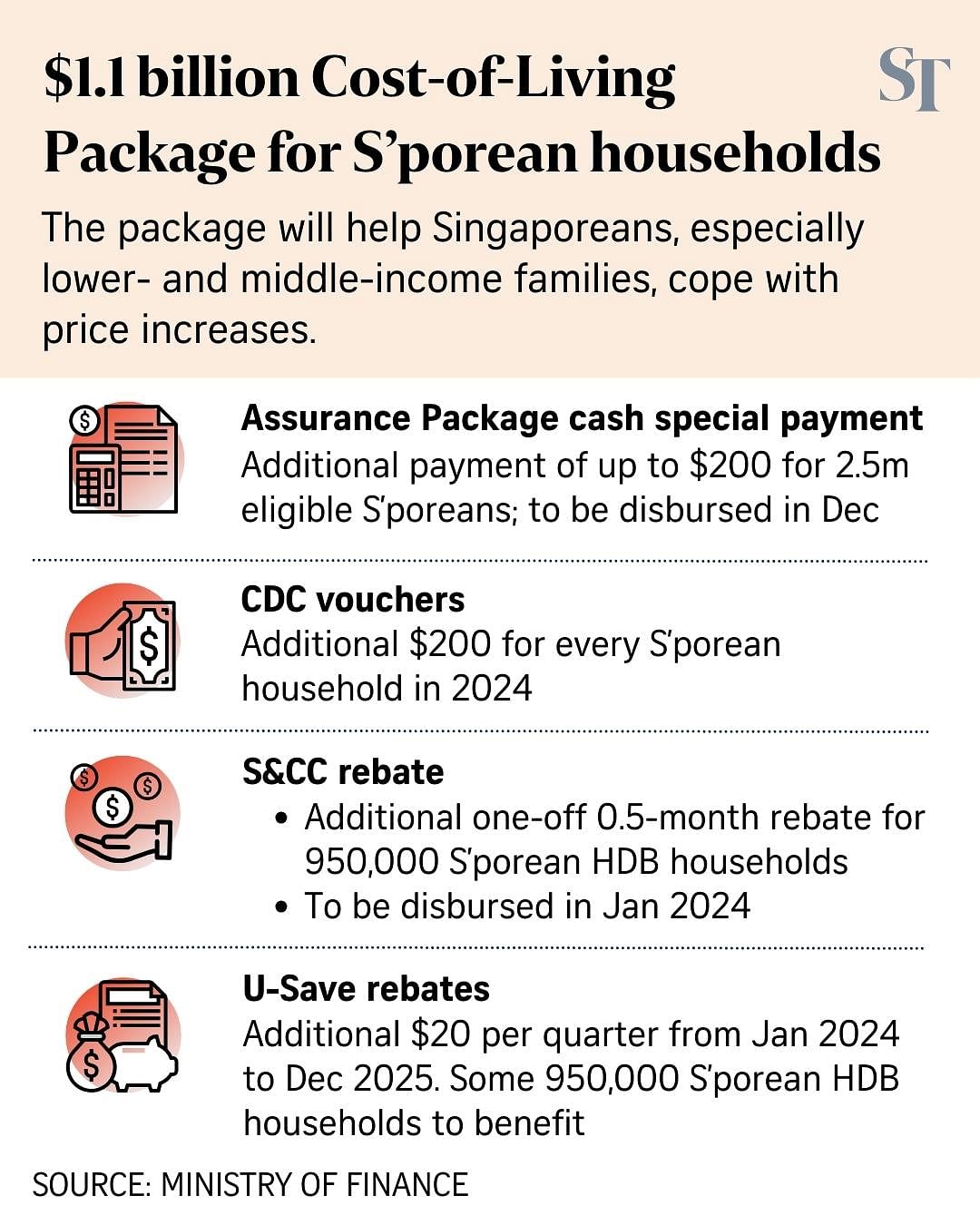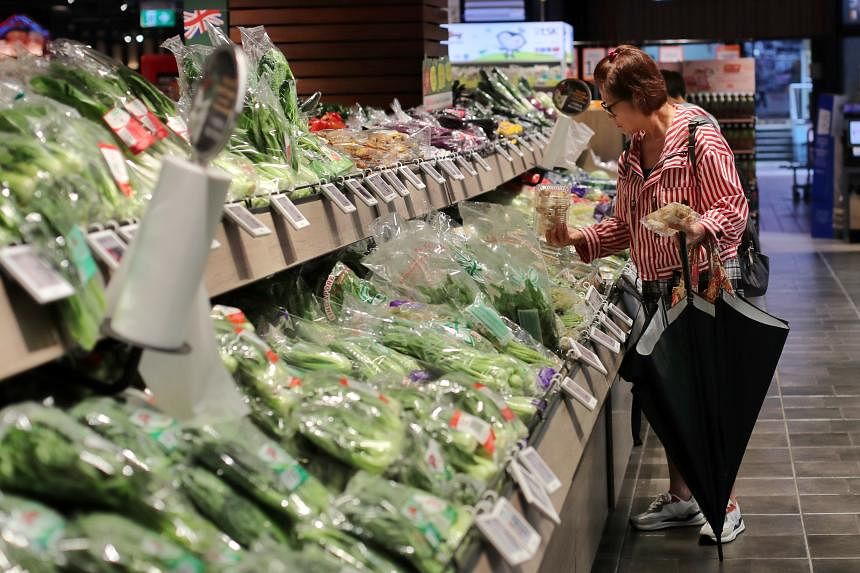SINGAPORE - Deputy Prime Minister and Minister for Finance Lawrence Wong on Thursday announced a $1.1 billion Cost-of-Living Support Package for Singaporean households, particularly lower- to middle-income families, to help with the rising cost of living.
“I know that many Singaporeans are anxious about the overall economic outlook, the price increases and the impact on their cost of living. The Government is committed to supporting Singaporeans through these uncertain times,” he said.
After announcing various support measures and payouts – which include an additional cash payout of up to $200 for 2.5 million Singaporeans, and an extra $200 in Community Development Council (CDC) vouchers for every Singaporean household – Mr Wong answered questions from the media, including on the impetus for the package and the financial sustainability of such payouts.
Here are some of the highlights:
1. Why is this support package coming now, beyond what was announced in Budget 2023?
Mr Wong said that in the course of the year, there were certain things that were not planned for, such as recent price increases, possible disruptions to energy and food supplies, and uncertainties in the global environment.
National water agency PUB announced on Wednesday that water will soon cost consumers an additional 50 cents per cubic m, starting with a 20-cent increase in April 2024 and a 30-cent rise in April 2025.
“We’ve decided after looking at all the factors, looking at our fiscal position, we will be able to provide, within our budget, for such an additional package.”

2. How is the Government ensuring that rising business costs are not unfairly passed on to consumers, especially for hawker food?
Mr Wong said the Government is monitoring the impact of the cost changes on sellers in the food and beverage industry, including that of water and ingredients.
“So far, we think the overall impact on their cost is actually a relatively small proportion of their overall cost.
“There are many other cost items like rental and labour that are much bigger sources of cost than these relatively smaller components,” he added.
Nevertheless, Mr Wong noted that whatever cost increases there are, they will eventually filter down into prices, so the Government is monitoring the impact of price increases and how it can cushion these for consumers.
This is why it included the extra $200 CDC vouchers in the package.
“Another aspect of this is to make sure that there is no profiteering because that (is), from a consumer point of view, a source of concern that whether it’s hawkers or other businesses, (they) may use these price increases as an excuse to profiteer; increase prices more than necessary,” said Mr Wong.
He added that the Government has a committee set up against profiteering, and will continue to monitor such behaviour.
3. Why are businesses not covered in this package?
While the Government had provided support for businesses during the Covid-19 pandemic, there were no such measures in the latest package.
Mr Wong said the focus of the Cost-of-Living Support Package was the impact on consumers, particularly the lower- to middle-income families, and providing support to cope with inflation.
He acknowledged that costs may be higher for businesses, but said the Government cannot permanently subsidise businesses.
“The businesses must be self-sustaining. They must be profitable, they must be viable – and what’s important for businesses is to continue to restructure, continue to focus on moving up the value chain, be more efficient, be more productive, and all the schemes we have in the Budget so far have been supporting this direction,” said Mr Wong.
He added that the Government will continue to think of ways to help businesses along this path, not so much to prop up unviable businesses, but to help businesses become more productive and efficient.
4. Will the Government continue to roll out off-Budget packages, and is it sustainable?
Mr Wong responded: “It’s not as though we planned for this. This is not by design. Ideally, we don’t have to.”
He noted that if the economic environment and inflation were stable, the Government would prepare for such expenditures in the Budget, and that should provide for all anticipated needs across the year.
“But in recent years, we have seen so many uncertainties in the economic environment, a lot of volatility, new sources of disruptions, and that’s why in recent years we’ve had more instances of off-Budget packages being rolled out, and this year is like that,” said Mr Wong.
“Will this be the pattern in the future? No one can tell. As I said, our preference, of course, would be to prepare and provide for things within the Budget itself.
“But if there are these unpredictable changes in the external environment, then certainly the Government will always stand ready to respond promptly and swiftly and to make sure we provide all the necessary support for Singaporeans.”
The Government did not need to dip into past reserves for the Cost-of-Living Support Package, and it did not have to file a supplementary supply Bill, as the costs were within the current provisions that were included in 2023’s Budget.
Mr Wong said: “Down the road in Budget 2024, we will probably have to do a supplementary supply Bill to cover the additional funding, and how much exactly, we will provide the details in due course.”
5. Is the Government looking at other sources of revenue?
The Government’s “critical imperative” is to make sure public finances always remain sound and sustainable, said Mr Wong.
While it is prepared to spend more to address the social and healthcare needs of Singapore’s ageing population as well as vulnerable groups, it has to ensure there is sufficient revenue to cover the spending.
He noted that this is why the goods and services tax (GST) is so important, and the Government will continue to look at revenue sources to make sure that Singapore’s fiscal position is sound and sustainable.
“In the coming years, we should be all right. (That) doesn’t mean that we will stop looking at revenue sources; we will continue to do so. And there were a range of different options we will continue to explore,” said Mr Wong.
Asked if the Government would consider tweaking the Net Investment Returns Contribution (NIRC), Mr Wong said this would involve drawing from Singapore’s past reserves, and that the current formula for the NIRC has been specified in the Constitution.
“I think that’s fair, I don’t think we should touch that for quite some time. But if there’s a need for more money, we look at additional revenues from different sources. It could be from income, it could be from wealth, it could be from a whole range of different options.
“But for the time being, looking at where we are, I think we are, with the GST increase, in a good position, or at least a stable position where our public finances are concerned in the near future,” he said.


